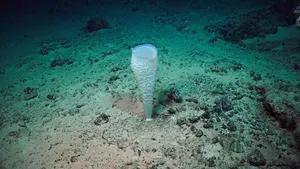
Unlocking Ocean Secrets: How Deep-Sea Sponges Influence the Marine Nitrogen Cycle
2025-09-09
Author: Daniel
Exploring Ancient Wonders in the Deep Sea
A groundbreaking project led by Dr. Tanja Stratmann, titled "Nitrogen Cycling in Modern Sponges with Clues About Their Role in Past Oceans" (or SPYCLING), is set to reveal the hidden contributions of deep-sea sponges to our planet's nitrogen cycle. These remarkable organisms, among the oldest animals on Earth, have thrived in diverse aquatic environments for millions of years, from tranquil lakes to the depths of the ocean.
The Mystery of Nitrogen in Sponges
Despite their ancient lineage, our understanding of how sponges interact with nitrogen – an essential nutrient for marine life – is still quite limited. Utilizing stable isotopes, researchers can uncover the roles that sponges play within the food web. Dr. Stratmann has uncovered astonishing insights: the chemical profiles of glass sponges differ vastly from what was previously believed, challenging existing assumptions about their ecological roles.
Deep Insights from the Depths
Dr. Stratmann's innovative research involves deploying incubation chambers at ocean depths of around 4,000 meters to study these sponges in their natural habitats. After gathering crucial data over a few days, she plans to bring this information back to the surface for analysis, emphasizing that surface studies simply cannot capture the full story of these abyssal dwellers.
Peering into the Past: Fossilized Sponges
In addition to living sponges, the project will investigate ancient specimens, shedding light on historical nitrogen cycles. By extracting nitrogen compounds from fossilized sponges, Dr. Stratmann aims to decode the environmental conditions of ancient oceans, offering a time capsule of underwater life from eras long gone.
The Next Chapter for Dr. Stratmann
Returning to the University of Bremen marks an exciting new milestone for Dr. Stratmann. A recipient of the Veni scholarship, she is eager to leverage the university's exceptional research facilities to advance her exploration of deep-sea ecosystems. MARUM, the marine research center at Bremen, champions innovative studies that tackle pressing environmental challenges.
A Bright Future for Marine Research
MARUM's director, Kai-Uwe Hinrichs, expressed excitement about the project, highlighting its significance for understanding deep-sea life and addressing human impacts on these crucial habitats. The project's success adds to the center's reputation as a leading institution in marine biogeochemistry and ecology.
ERC Starting Grant: Fueling Future Discoveries
The ERC Starting Grant has granted Dr. Stratmann nearly €1.5 million over five years, an investment aimed at empowering emerging researchers across Europe. With 478 recipients chosen from nearly 4,000 applicants, this prestigious acknowledgment underscores the project's potential to pioneer advancements in marine science.
Committed to Our Ocean's Future
MARUM not only pushes the boundaries of scientific knowledge but also ensures its findings are accessible to the public, fostering a dialogue on marine preservation and sustainability. As collaborations with industry continue, MARUM remains dedicated to protecting the marine environment in alignment with global sustainability goals.



 Brasil (PT)
Brasil (PT)
 Canada (EN)
Canada (EN)
 Chile (ES)
Chile (ES)
 Česko (CS)
Česko (CS)
 대한민국 (KO)
대한민국 (KO)
 España (ES)
España (ES)
 France (FR)
France (FR)
 Hong Kong (EN)
Hong Kong (EN)
 Italia (IT)
Italia (IT)
 日本 (JA)
日本 (JA)
 Magyarország (HU)
Magyarország (HU)
 Norge (NO)
Norge (NO)
 Polska (PL)
Polska (PL)
 Schweiz (DE)
Schweiz (DE)
 Singapore (EN)
Singapore (EN)
 Sverige (SV)
Sverige (SV)
 Suomi (FI)
Suomi (FI)
 Türkiye (TR)
Türkiye (TR)
 الإمارات العربية المتحدة (AR)
الإمارات العربية المتحدة (AR)